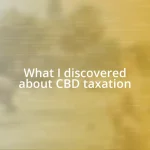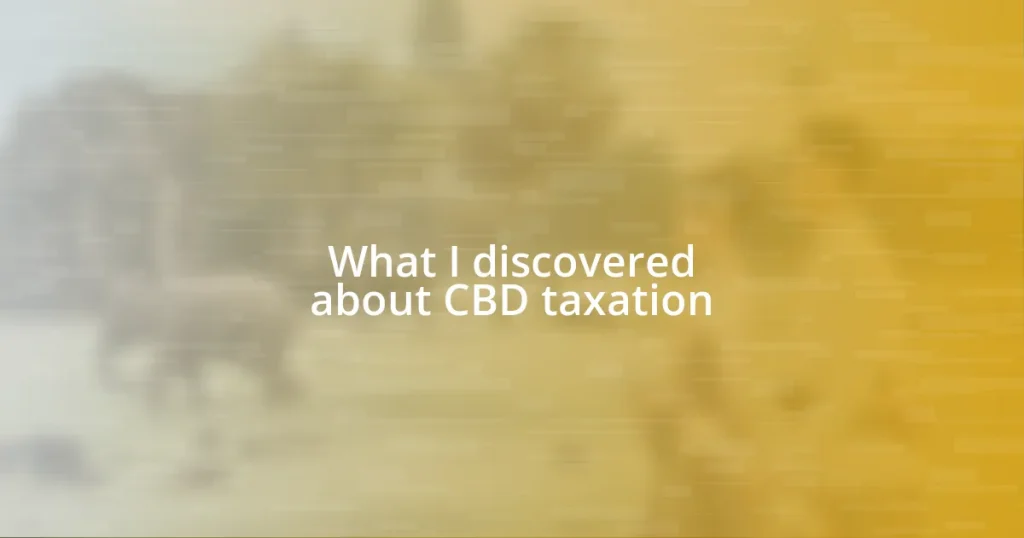Key takeaways:
- CBD taxation varies significantly by state, affecting compliance and profitability for businesses.
- Key taxes include sales tax, excise tax, and federal income tax, each requiring thorough understanding for business success.
- Maintaining organized record-keeping is essential for managing tax obligations and preparing for audits.
- The future of CBD taxation may trend towards greater clarity and technology adoption, simplifying compliance for business owners.
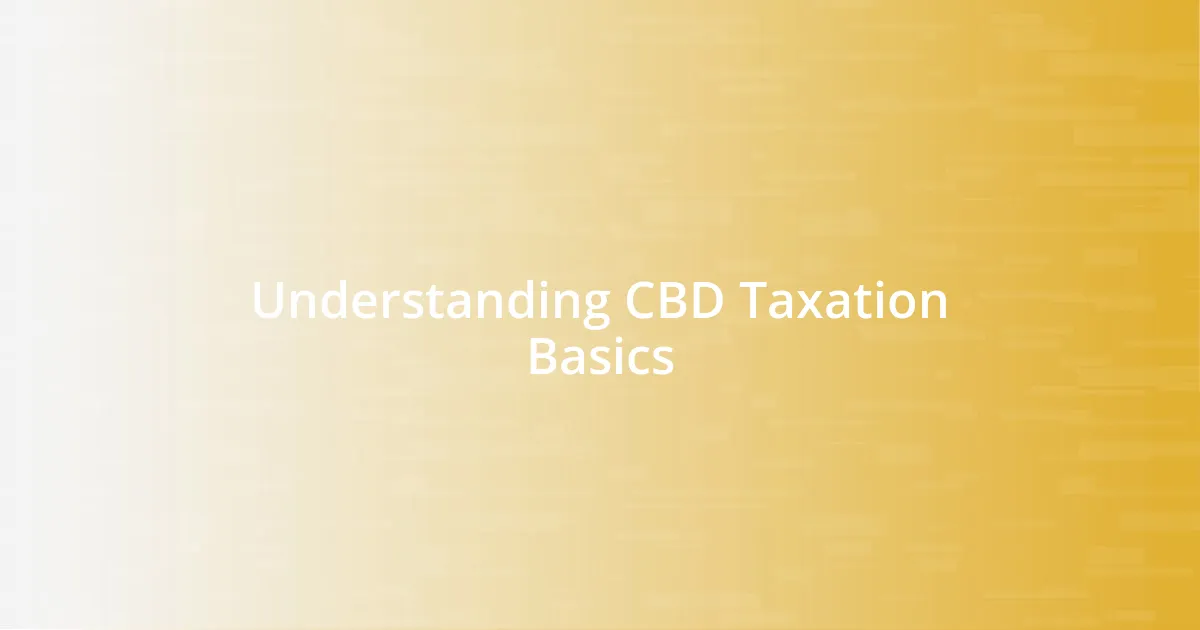
Understanding CBD Taxation Basics
When diving into CBD taxation, it’s essential to first understand that the rules can vary significantly by state. I remember uncovering just how different these regulations could be during a chat with a small business owner who thought they were safe under federal law, only to find out that their state had its own distinct set of guidelines. It left me wondering: how many entrepreneurs are aware of these regional nuances?
At the federal level, CBD derived from hemp has been legalized, yet it’s still classified under specific regulatory frameworks. What struck me was the irony in how a product could be considered legal yet still be subjected to myriad taxes that often feel overwhelming. This complexity makes me question, can small businesses truly thrive in such an unpredictable market?
Moreover, understanding excise tax plays a crucial role in this landscape. I recall attending a webinar where a tax expert emphasized that knowing whether you’re subject to state excise taxes could make or break your profit margins. It made me appreciate the importance of thorough research before stepping into the CBD market—each detail can significantly impact your bottom line, and that awareness is crucial for any operator in this field.
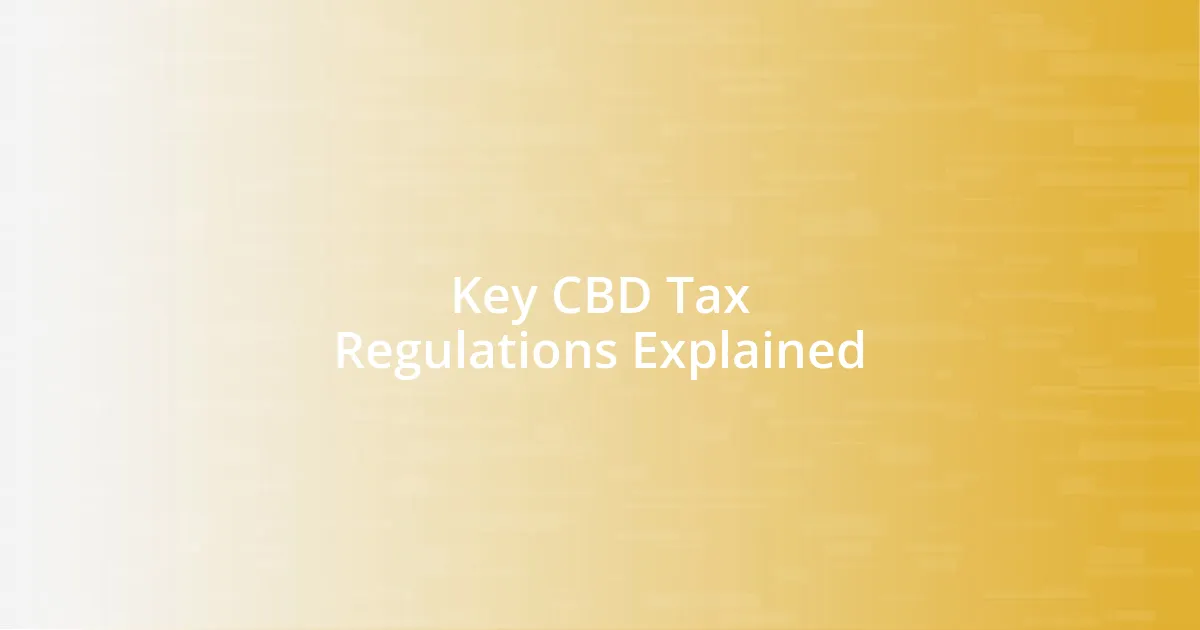
Key CBD Tax Regulations Explained
Navigating CBD tax regulations can feel like walking through a maze. I vividly recall my first encounter with the tax implications of CBD when I stumbled upon a local farmers’ market, where vendors shared their confusion over varying tax codes. Their frustration mirrored my own as I learned about sales tax, excise tax, and even the additional taxes specific to CBD products. Each vendor had a different story, illustrating the inconsistent landscape of regulations across states.
Here are some key tax regulations to keep in mind:
-
Sales Tax: Depending on your state, CBD products may or may not be subject to sales tax. Knowing if your product qualifies can directly impact pricing strategies.
-
Excise Tax: This is often levied on specific goods such as alcohol and tobacco. Some states also impose it on CBD, which can reduce your profit margins significantly.
-
Federal Income Tax: Despite being legal, CBD businesses must still report their income, which can be complex depending on your state’s respective tax structures.
-
State-Specific Regulations: Always research your state-specific guidelines, as many regions have unique requirements that can complicate compliance.
Understanding these regulations not only aids in legal compliance but also instills confidence in business operations. When I saw how some vendors adjusted their products in response to these regulations, it inspired me to delve deeper into the financial aspects of being in the CBD market. Every detail can make a substantial difference in profitability and sustainability in this evolving industry.
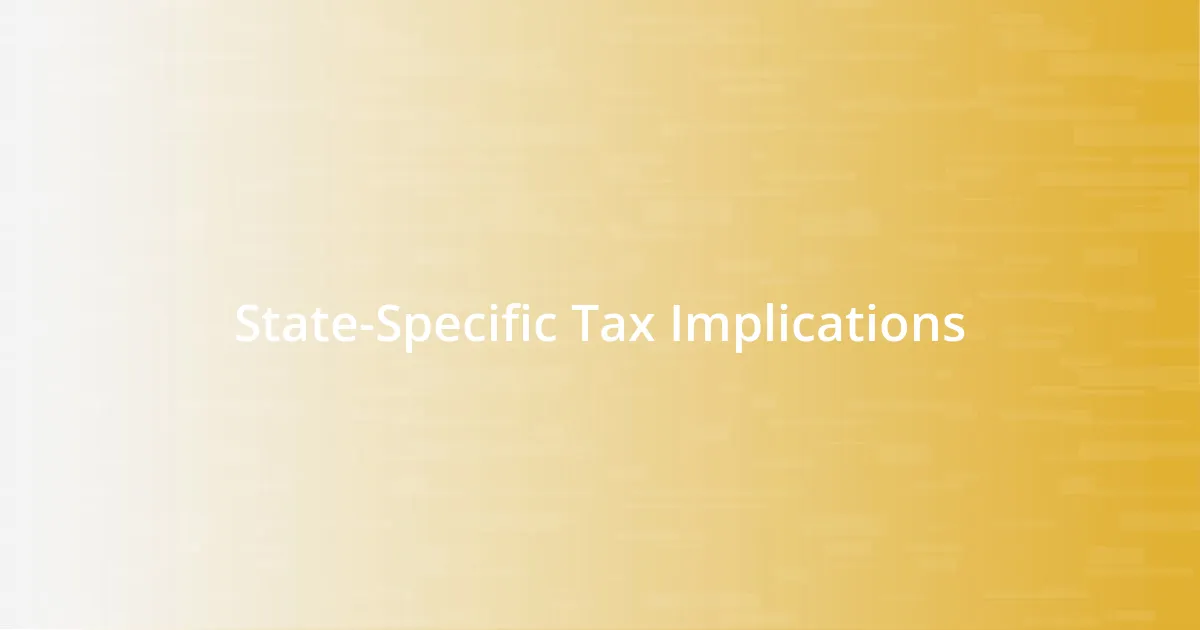
State-Specific Tax Implications
State regulations surrounding CBD taxation are a veritable patchwork, each with its nuances and complexities. I can recall a conversation I had with a friend in California who was surprised to learn that while CBD is legal there, the state imposes not just sales tax but also certain excise taxes. This revelation struck me as a reminder that staying informed about state regulations is not merely an option; it’s a necessity for anyone operating in this space.
In contrast, I met another entrepreneur from Texas who shared how beneficial the lack of a state income tax had been for his CBD venture. He pointed out that while his state does have its own sales tax on CBD products, the overall taxation burden was lighter than in states like New York. This juxtaposition makes it clear that the state in which you operate can dramatically influence your financial landscape and decision-making processes.
It never ceases to amaze me how these state-specific tax implications can shape the CBD industry differently across the U.S. Knowing someone who faced hefty penalties for non-compliance in a stringent state made the risks all too real. This emphasis on local regulations reminds me that we’re all part of a broader narrative; understanding state discrepancies is key to contributing effectively and responsibly to the CBD market.
| State | Sales Tax on CBD | Excise Tax on CBD |
|---|---|---|
| California | Yes | Yes |
| Texas | Yes | No |
| New York | Yes | Yes |
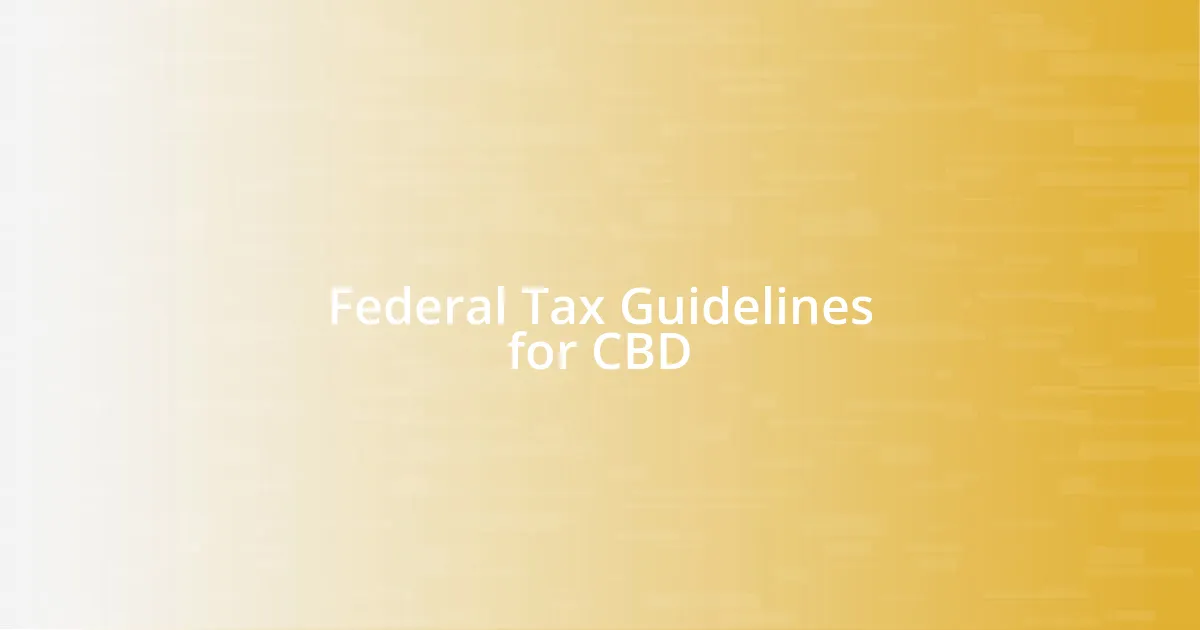
Federal Tax Guidelines for CBD
Navigating the federal tax landscape for CBD products can feel overwhelming. I remember talking to a someone who had recently launched their CBD business. They were both excited and anxious about federal income tax obligations. What surprised them most was that, unlike many other products, CBD isn’t treated like most agricultural goods for tax purposes. Instead, business owners must classify their CBD sales accurately to avoid hefty penalties.
I learned that while CBD is federally legal, it faces rigorous taxation based on its classification. For instance, if you’re producing CBD products, the IRS may categorize your business in a way that affects your overall tax liability. A friend once shared how a simple misclassification led to unexpected tax liabilities, which made me realize just how crucial it is to understand these nuances fully.
Furthermore, I often hear people ask if they can deduct ordinary business expenses associated with CBD production. From my experience, yes, you can. However, the lack of clarity around IRS guidelines can create uncertainty. I once attended a workshop on tax strategies for CBD business owners, and it became clear that having proper bookkeeping and consultation with a tax professional was essential. So, have you considered how a tax expert could make a difference in your operation? It might just save you from a big financial headache down the road.
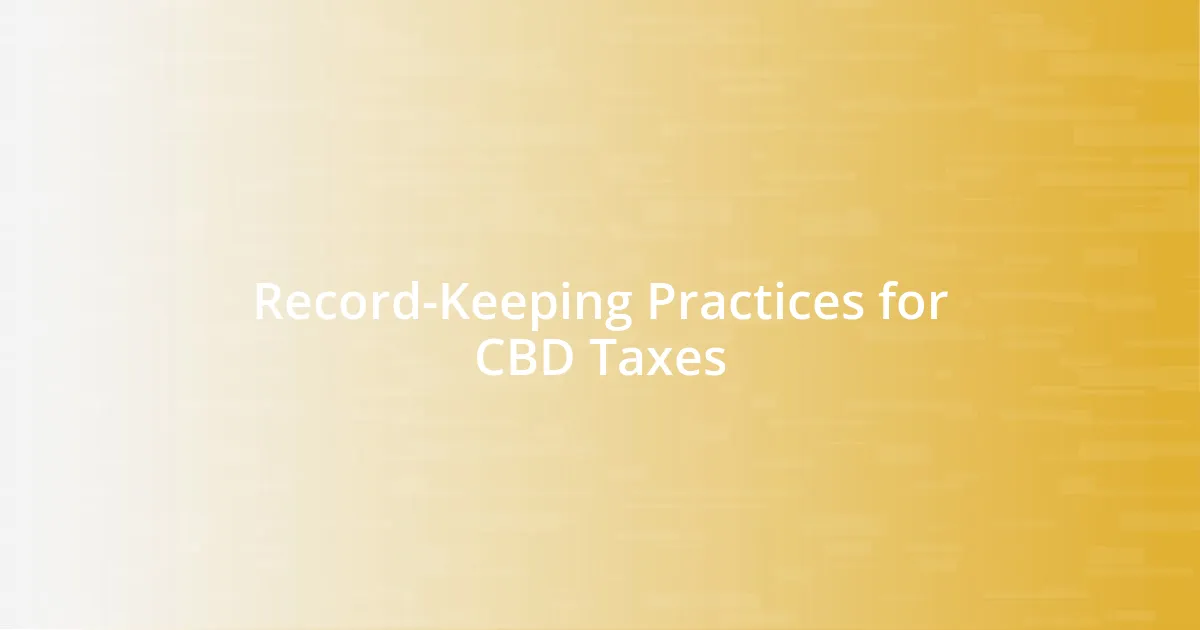
Record-Keeping Practices for CBD Taxes
Maintaining clear and organized records is non-negotiable for anyone in the CBD business. I remember my first tax season as a CBD seller, and the stress of trying to gather receipts and invoices from various sources was almost overwhelming. I quickly learned that implementing a streamlined record-keeping system not only alleviated some anxiety but also ensured I didn’t miss out on potential deductions. How many of you have felt that last-minute scramble when tax deadlines loom?
In my experience, categorizing expenses as they occur makes a world of difference. I found that separating costs related to production, marketing, and distribution helped me keep track of my overall financial health throughout the year. A friend of mine even created a dedicated folder on her computer for digital invoices, and the peace of mind she gained was evident. After all, don’t you want to spend less time worrying about compliance and more time growing your business?
Moreover, I can’t stress enough the importance of having backup documentation. As I dived deeper into the world of CBD taxation, I discovered that having detailed records can be a lifesaver in case of an audit. One year, I faced a situation where I was questioned about certain deductions, and thankfully, my meticulous record-keeping allowed me to provide necessary proofs without a hitch. Isn’t it reassuring to know you can stand confidently behind your paperwork when it matters most?
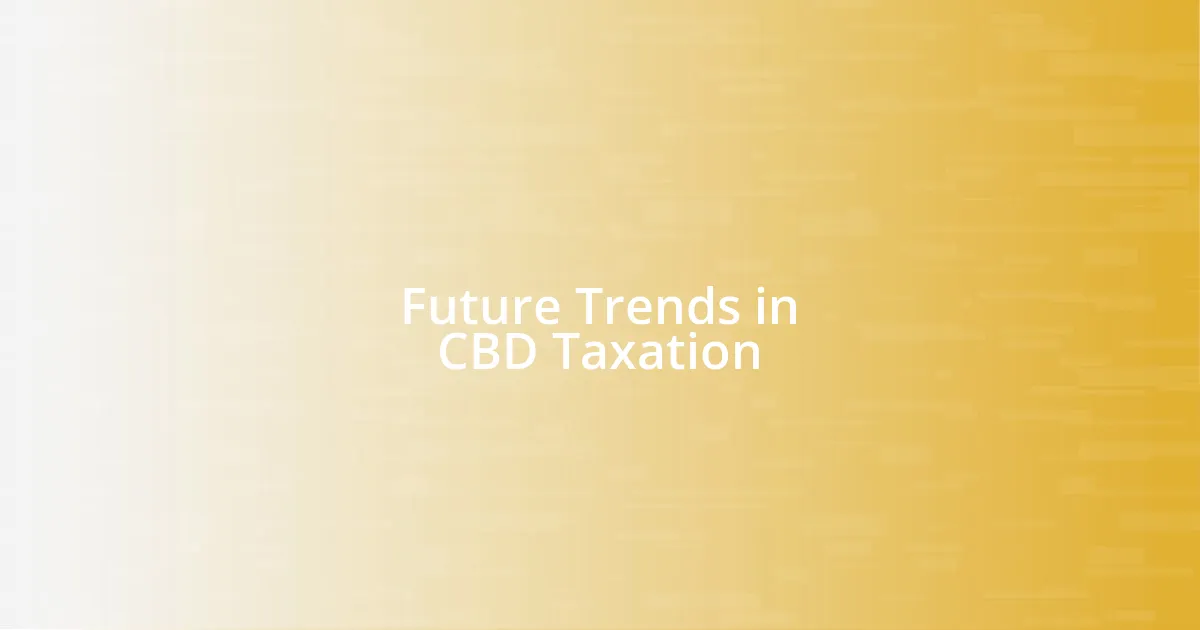
Future Trends in CBD Taxation
As I look ahead, it’s apparent that the future of CBD taxation will likely see increasing clarity and possibly new regulations. I recently attended a seminar on cannabis policy, and a key takeaway was the push from various industry advocates for more standardized tax regulations across states. It’s fascinating to think that as the market matures, tax codes may evolve, creating a more predictable environment for business owners. Isn’t it exciting to imagine a future where navigating tax obligations is less of a guessing game?
From my perspective, I believe the rise of technology will play a crucial role in CBD taxation trends. I’ve seen firsthand how automated accounting tools can simplify tax preparation and reporting for small businesses, making it easier to maintain compliance. When I was starting out, adopting a digital invoicing system transformed my workflow and saved me countless hours. Have you ever considered how tech solutions could ease your tax headaches?
Moreover, I anticipate that public awareness and education around CBD taxation will grow, leading to stronger advocacy for better tax treatment. I remember stumbling upon online forums where CBD entrepreneurs shared their experiences and challenges, which opened my eyes to the collective voice in this community. As more people become informed, I suspect we could see changes in both local and federal policies that reflect the needs of CBD businesses. It’s empowering to think about the potential these evolving conversations can have on our industry.





